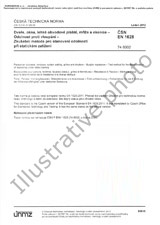We need your consent to use the individual data so that you can see information about your interests, among other things. Click "OK" to give your consent.
ČSN ETSI EN 302574-1-V2.1.2 (876052)
Satellite Earth Stations and Systems (SES); Harmonised Standard for Mobile Earth Stations (MES) operating in the 1 980 MHz to 2 010 MHz (earth-to-space) and 2 170 MHz to 2 200 MHz (space-to-earth) frequency bands covering the essential requirements of article 3.2 of the Directive 2014/53/EU; Part 1: Complementary Ground Component (CGC) for wideband systems
Translate name
STANDARD published on 1.1.2017
The information about the standard:
Designation standards: ČSN ETSI EN 302574-1-V2.1.2
Classification mark: 876052
Catalog number: 501503
Publication date standards: 1.1.2017
SKU: NS-672496
The number of pages: 90
Approximate weight : 301 g (0.66 lbs)
Country: Czech technical standard
Category: Technical standards ČSN
The category - similar standards:
Annotation of standard text ČSN ETSI EN 302574-1-V2.1.2 (876052):
V2.1.2
The present document applies to Complementary Ground Components (CGC) operating as part of a satellite network.
The present document covers two types of CGC:
- Conventional CGC:
- - Clauses 4 and 5 according to ETSI EN 301 908-18 [16] for W_CDMA
- - Clauses 8 and 9 according to ETSI EN 301 908-14 [10] for E-UTRA
- - Aeronautical CGC
These Complementary Ground Components (CGC) transmit only to the User Equipment/ Aeronautical Terminal or transmit and receive to/from the User Equipment/ Aeronautical Terminal in the frequency bands allocated to the Mobile Satellite Service (MSS) on a primary basis as defined in table 1.
NOTE 1: The CGC may include various types of interfaces, to terrestrial and/or satellite networks, but their specifications are out of the scope of the present document.
The present document applies to Complementary Ground Component (CGC) radio equipment type deployed in Mobile Satellite Services systems which have the following characteristics:
- - These CGCs may have both transmit and receive capabilities and are part of a hybrid Satellite/terrestrial network.
- - These CGCs operate with an assigned channel signal bandwidth (CBw) of 1 MHz or greater.
- - The conventional CGCs may be local coverage, medium coverage or wide coverage ground components.
- - The aeronautical CGCs may transmit/receive toward/from terminal mounted on aircraft (Aeronautical Terminal).
- - These CGCs may be an element in a multi-mode base station. It may consist of a number of modules with associated connections, or may be a self-contained single unit.
If the CGC is an element in a multi-mode base station, unless otherwise stated in the present document, its requirements apply only to the CGC element of the terminal operating in the Mobile Satellite Service (MSS) frequency bands given in table 1.
The present document applies to the following terminal equipment types:
- 1) Complementary Ground Components for Wideband Satellite Systems.
The present document only applies to the radio interface between the conventional CGC and the User Equipment or between aeronautical CGC and Aeronautical Terminal.
The present document is intended to cover the provisions of Directive 2014/53/EU [13] (RE Directive) article 3.2 which states that "Radio equipment shall be so constructed that it both effectively uses and supports the efficient use of radio spectrum in order to avoid harmful interference".
NOTE 2: In addition to the unwanted emission limits defined in clauses 4.2.2 and 5.2.2 of the present document, additional operational constraints may be required to prevent harmful interference into services op-erating in the neighbouring bands outside the operational band defined in table 1.
In addition to the present document, other ENs that specify technical requirements in respect of essential re-quirements under other parts of article 3 of the Directive 2014/53/EU [13] may apply to equipment within the scope of the present document.
NOTE 3: A list of such ENs is included on the web site
Preview of the standard ČSN ETSI EN 302574-1-V2.1.2 (876052)
We recommend:
Technical standards updating
Do you want to make sure you use only the valid technical standards?
We can offer you a solution which will provide you a monthly overview concerning the updating of standards which you use.
Would you like to know more? Look at this page.




 Cookies
Cookies
